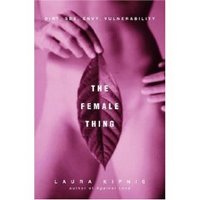Author Talk: Laura Kipnis of "The Female Thing"

Tonight I heard author Laura Kipnis speak tonight about her book The Female Thing at The Regulator Bookshop, one of our wonderful local independent bookstores. I had just finished reading the book today, and though it was raining very hard, I made the trip up to Durham to get my burning questions answered.
According to Kipnis, her work is about the four quadrants of the female psyche--a survey of our conflicted mental landscape at the beginning of the 21st century. She divides the territory into dirt, sex, envy, and vulnerability and considers the contradictions and tensions within the female mind. These clashes accumulate at the meeting point between feminism and feminity in each woman's psyche.
Kipnis admits that her book paints a rather bleak picture and that the emanicpation occurs after the book ends, "a new form of optimism produced out of honesty about the situation." (Sounds like our hopes for honest discussions about motherhood, doesn't it?) I actually found her book to be almost compulsively readable and quite funny at times. Kipnis says that she is writing about and for mainstream culture, using the techniques of an essayist rather than a sociologist or journalist. This is how I approached her book since she makes many assertions that she doesn't back up with evidence. Many are reasonable but debatable statements such as "The opposite of desire isn't aversion, it's indifference...." I would have a hard time if she were presenting that as sociological fact, but I can accept such assertions as opinions that are shaping her framework.
What is depressing about Kipnis' work? She finds that as women's equality advances, steps of progress are followed by self-imposed limits, the "inner woman suspended between progress and tradition." The entire book is about contradiction and ambivalence--a juicy topic in my mind but one that is sure to make each reader squirm at some point. For me, I had a hard time with her final chapter on Vulnerability that concluded that a dark side of feminism's approach to rape awareness advocacy is women's fascination with violation and a propensity for female masochism--you could say an addiction to the role of victim. When Kipnis explained her point of view in person it was clearer, but when I read the book this section just made me angry. She was making a very serious assertion and in the book I didn't feel that she had supported her case very well, and when I did understand it I still didn't necessarily agree with her.
I was interested in the intersection between her book and my work, or should I say, my life. I found the chapter on Dirt to be hilarious and enlightening. I have a messy house and still feel a little bit guilty about it, but not guilty enough to really do anything about it. So I live with clutter and ambivalence. Kipnis covers this topic and the deep, unconscoius assocations between dirt and gender roles with insight and humor. I appreciated her coverage of the social purity movements of the 19th century and the connection with women's roles and appropriation of power in the domestic sphere. The entire discussion is too much to go into here, but I am intersted in pursuing the connections between Kipnis' work and linguist George Lakoff's theory of metaphors that define our mental world views--I think some interesting synergy could be found there. Namely, what is the link between purity and cleanliness and the conservative worldview in 21st century America?
I wish Kipnis addressed motherhood more directly in her book. She talks a lot about vaginas and sexuality but not so much about motherhood. For me, motherhood is the defining life event that brings feminism and femininity into focus and conflict for many upper-middle-class white American women. Second-wave feminism pushed back the frontier of apparent gender equality to....motherhood. Women can go to college, grad school, med school, etc. and compete on the corporate ladder/partner track, and we can have what seem to be egalitarian marriages, but once we become parents we can snap right into the June and Ward Cleaver roles and wonder what the hell has happened to our lives.
The illusion of equality and a level playing field is shattered once we take on the most feminine role of all, mother. This exposes the limits of equity feminism, the "plan A" most successful form of feminism, which Kipnis criticizes as being the most conservative form of feminism, because it leaves social structures in place and focuses on women's advancement as the ability to compete within a male framework without challenging it.
To get academic about it for a minute, during the discussion, Professor Robyn Wiegman, director of Women's Studies at Duke said that she felt that Kipnis was diagnosing a condition of privileged white women who feel undercut by femaleness. I would aruge that for many women, motherhood is the moment of truth that exposes the contradictions between these social axes. And, by being disempowered by female gender roles, women may for the first time become aware of the white and economic privilege they had always enjoyed without really thinking about it. (The unconscious nature of privilege an integral part of it, by the way, like a wind at your back during a bike race that you don't even realize is helping you.)
This is part of why I believe that motherhood can be a consciousness-raising experience that can get women to look beyond their privileged lives and become leaders for social change. That feels like a good note to end on for this Election Day. I may go to a lunch seminar tomorrow to hear another discussion with Kipnis and I'll blog about it if I do.



0 Comments:
Post a Comment
<< Home